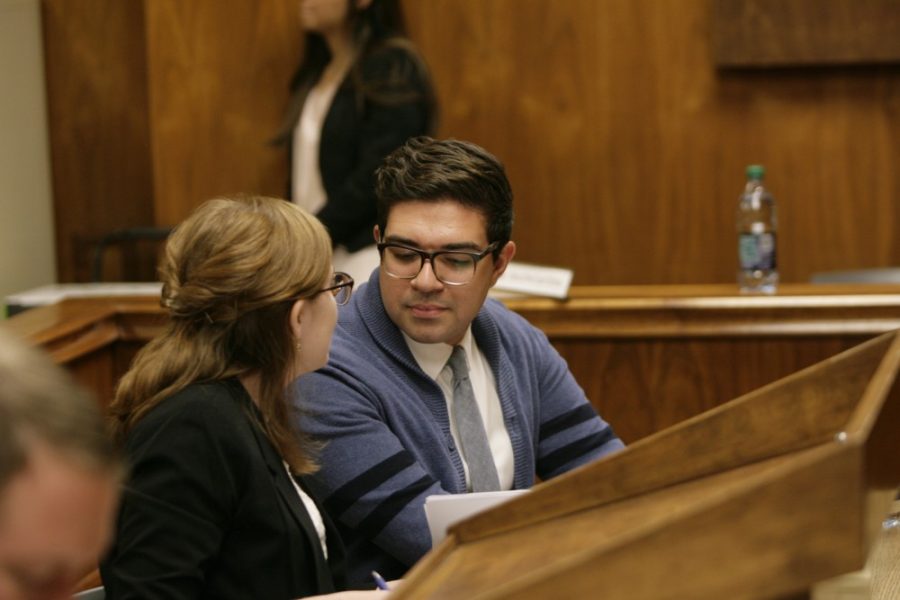A three-sentence section of the ASUA Elections Code may decide the outcome of this year’s ASUA executive vice presidential election.
The hearing
An overflowing courtroom watched council representing ASUA executive vice presidential candidate Stefano Saltalamacchia and the ASUA Elections Commission argue their points to the ASUA Supreme Court over Saltalamacchia’s appeal that Sen. Trey Cox should be disqualified from the election.
Arguments on both sides centered around two points — the definition of what Chief Justice James Carlson called “hear-say,” where hear-say is applicable in the complaint process and where the line is drawn where it can be considered grounds enough to impose a strike against a candidate; and the interpretation of a particular section of ASUA Elections Code referring to testimonies in complaints.
Cox was disqualified by Elections Commissioner Diego Alvarez following complaints that ultimately levied five strikes against Cox for illegal campaign activities and an accusation of harassing speech. However, following review by the ASUA Elections Commission — a board made of 11 members who’s identities have not been disclosed by ASUA — overturned all five strikes.
The commission cited section 5-4.02 of the ASUA Elections Code to overturn all five strikes against Cox with the singular addition of saying that there was not enough evidence to substantiate one of the complaints.
Instead of directly addressing the accusations of dorm-storming, providing electronic devices to voters with which to vote with and harassing speech that were levied against Cox, the five strikes were overturned with the formality that witness testimony alone is not enough to substantiate a complaint.
Section 5-4.02 of the code says:
“Complaints against a candidate must be accompanied by evidence supporting the complaint and shall be attached to the complaint form. Testimony shall not be the sole basis of a complaint. Complaints against a candidate that rely solely on testimony and or lack of evidence shall not be considered.”
This section of the code, which was added following last year’s controversial presidential election between Manny Felix and Hannah Sager, is being leveraged differently by both sides.
The council representing Saltalamacchia claims that this definition of what constitutes “testimony” is up for debate and that the requirement for evidence aside from eye-witness accounts is severely limiting to the types of infractions that can be reported. The council for the Elections Commission argues that the section is very cut-and-dry and that requiring evidence outside of eye-witness accounts cuts back on the opportunity for “gamesmanship” by candidates and their campaigns.
The complaints
Three complaints were ultimately levied against Cox. Out of the three complaints, there were enough infractions cited in each one to eventually cause the Elections Commissioner to disqualify him with five strikes — only three are needed for disqualification.
The strikes were: dorm-storming, providing electronic devices to voters to vote with and harassing speech.
The majority of the argument is regarding two out of the three complaints — complaints which are strikingly similar. Both outline events that took place at the Kappa Alpha Theta sorority house on Tuesday, March 1, in which Cox and his escort Christine Hall, a neuroscience junior and Kappa Alpha Theta sister, were allegedly seen walking through the house during lunch, asking people to vote for Cox on his cellphone and telling them to not vote for the “cross dresser.”
Saltalamacchia said that this similarity in the two complaints is for a reason.
Indigo Sargent, a Biology sophomore and Kappa Alpha Theta sister, and her roommate, Xoe Watchman, a anthropology and Nutritional Psychology sophomore, contacted Saltalamacchia after they were approached by Cox and Hall in the Kappa Alpha Theta house that day. Sargent knew that what she had seen was not right as per the elections code and wanted to complain, but she didn’t know how.
Saltalamacchia pointed her in the right direction — he sent her the general email for ASUA elections and at 9:44 p.m. on March 1, she emailed in her account of what happened, thinking it would count as a complaint.
Saltalamacchia said that Ali Gates, deputy elections commissioner, told him that Sargent’s account wouldn’t be counted as a strike because it wasn’t on the official complaint form.
“She didn’t know how to file the complaint, so I went and did it for her,” Saltalamacchia said. “And when Ali [Gates] said it wasn’t filed by her, I grabbed the complaints sheet and I found her and I had her fill it out too.”
This accounts for the duplicate complaints. One filed by Saltalamacchia and one filed by Sargent.
Both Sargent and Watchman backed up Saltalamacchia’s claims of Cox’s alleged illegal campaigning. The pair reiterated the story, saying that they were approached by Cox and Hall and he handed them a phone with the voting page pulled up. He then told them they should vote for him.
“I am honest to god not following any of the election, so I was just going to vote for him,” Watchman said, adding that she felt uneasy and that this may not be right.
She said that while she was typing in her password he went on saying not-so-nice things about his opponent — causing her to hand the phone back to him without voting.
Sargent then contacted Saltalamacchia and the complaint process started.
The Supreme Court now has five business days to announce their ruling and 10 business days to release their official opinion.
Follow Sam Gross on Twitter.











